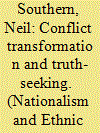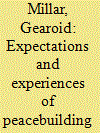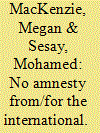| Srl | Item |
| 1 |
ID:
140736


|
|
|
|
|
| Summary/Abstract |
The main work of South Africa's Truth and Reconciliation Commission (TRC) took place between 1996 and the publication of its final report in 1998. Its purpose was to assist citizens come to terms with the violence of the past. All participants in the conflict were subjected to the Commission's investigations including the National Party that had held power from 1948 to 1994. During these years, the party became well established as both an ethnic and racial party. However, support for it fell dramatically between 1994 and 1999 (the year after the TRC published its report). The party's fortunes worsened in the 2004 elections that resulted in its dissolution in 2005. This article explores the effects of the truth-seeking process on the electoral fortunes of the party. The analysis makes use of unique qualitative material gained from research conducted with former senior members of the National Party including two cabinet ministers.
|
|
|
|
|
|
|
|
|
|
|
|
|
|
|
|
| 2 |
ID:
123994


|
|
|
|
|
| Publication |
2013.
|
| Summary/Abstract |
This article investigates local experiences of the Truth and Reconciliation Commission for Sierra Leone and explains how these experiences were influenced by the parallel administration of many peacebuilding processes. Using qualitative data it shows how the goals and procedures of these various processes overlapped and interacted in the imaginations of local people, generated unpredicted expectations, and eventually led to negative experiences of the Commission's work. I describe how Tsing's idea of 'friction' can helpfully explain local experiences of peacebuilding and the new concept of 'compound friction' is introduced as a tool for understanding the local impacts of parallel peacebuilding processes.
|
|
|
|
|
|
|
|
|
|
|
|
|
|
|
|
| 3 |
ID:
073020


|
|
|
| 4 |
ID:
098124


|
|
|
| 5 |
ID:
114087


|
|
|
|
|
| Publication |
2012.
|
| Summary/Abstract |
The literature on norms is dominated by debates over the definition of norms, discussion of the evolution of norms, norm diffusion, or norm implementation, and accounts of positive features associated with norms such as cooperation, mutual understanding. This paper argues that "the story" of international norms-or the dominant account of norms-is primarily a white, Western version that assumes that norms emerge from equal exchanges and relationship between states, denying the marked economic and political inequality between global actors and largely disregarding the intense contestations and controls associated with norms. In turn, this paper is an attempt to examine the tensions between so-called international norms and "local" norms and practices as well as the power dynamics and economic constraints that influence so-called global norms. Keeping in mind these tensions between the "story" of international norms and the practical constraints for local actors in the global south, this paper includes uses of the case study of Sierra Leone to examine what happens when "international" norms, such as those associated with transitional justice conflict with "local" norms. Specifically, the local norm of amnesty within Sierra Leone is studied in contrast to the international norm of truth and reconciliation commissions.
|
|
|
|
|
|
|
|
|
|
|
|
|
|
|
|